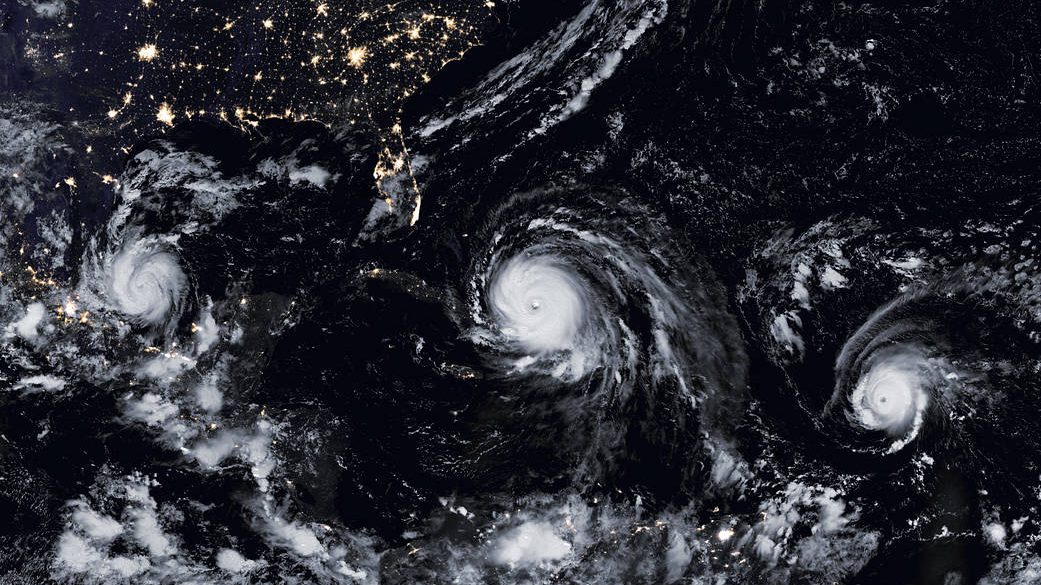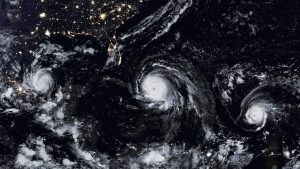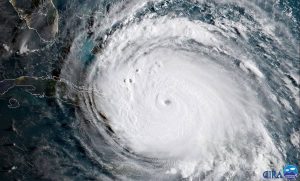Hurricane Projections and Climate Change


Image Credit: NASA Earth Observatory
2020 Hurricane Forecast
Researchers in the Department of Marine, Earth, and Atmospheric Science at North Carolina State University are forecasting that the Atlantic hurricane season, which begins on June 1st and continues through November 30th, is going to be more active than average. Dr. Lian Xie and graduate research assistant Xia Sun predict that 18 to 22 named storms will form in the Atlantic basin which comprises the entire Atlantic Ocean, the Gulf of Mexico and the Caribbean Sea. This NCSU press release explains that of the expected named storms, eight to 11 could become hurricanes with the potential for three to five storms to become major hurricanes (hurricanes that reach a Category 3 or higher on the Saffir-Simpson Hurricane Wind Scale). For comparison, the historical average of named storms that become hurricanes during hurricane season is six.
This prediction is similar to research announced from Colorado State University. Atmospheric Scientists on the CSU Tropical Meteorology Project team expect that the Atlantic hurricane season will contain 16 named storms and of those, eight storms are presumed to become hurricanes and four to become major hurricanes. Researchers cite the absence of El Niño, accompanied by above average sea surface temperatures in the tropical and subtropical Atlantic as main factors in this active forecast.
While climate change is known to lead to an increase in average sea surface temperatures, and thus more intense storms, a changing climate is not to blame in this particularly active hurricane season forecast. Dr. Gary Lackmann, SE CASC Faculty Affiliate and Professor in the Department of Marine, Earth and Atmospheric Sciences at North Carolina State University, who studies the relationship of climate change with hurricanes, flooding, and mid-latitude storms, provides some fundamental insight on these connections.
Climate Change and Hurricane Frequency
Lackmann explains that there is a substantial amount of inter-annual variability in the number of hurricanes that may be experienced in a hurricane season. This natural fluctuation is largely independent of climate change and is due to a combination of many oceanic and atmospheric factors – most notably, the El Niño Southern Oscillation (ENSO). ENSO is a recurring climate pattern in the tropical Pacific Ocean that influences seasonal weather trends across the globe. ENSO is comprised of El Niño, which is the warm phase of this oscillation, and La Niña, which is the cool phase. This warm and cool pattern shifts intermittently every 2-7 years, prompting expected variations in temperature, precipitation, and wind patterns. According to NOAA, while the central tropical Pacific Ocean temperatures have been warmer than average for several months, wind, rainfall, and cloudiness conditions remain neutral. This neutral ENSO forecast which falls between the two extremes of El Niño and La Niña, is expected to persist throughout the Atlantic hurricane season.
An additional challenge that exists when examining the relationship between climate change and the frequency of hurricanes is the lack of consistent long-term data sources. Today, meteorologists have superior technology that includes satellites, reconnaissance aircraft, ships, buoys, radar, and other land-based platforms to identify and monitor the progression of a storm in great detail. Prior to the first US weather satellite being launched 50 years ago, storms that didn’t make landfall could escape detection and never be documented in the historical record. Therefore, researchers can’t yet draw conclusions connecting climate change to hurricane frequency without a more extensive and reliable database.
Climate Change and Hurricane Intensity

Image Credit: NOAA/CIRA
Another characteristic of extreme hurricane events – intensity – does have ties to changing climate, and the intensity of these storm events is expected to increase as temperatures rise. To elaborate on this idea, Lackmann advises considering the difference between experiencing a thunderstorm in the winter versus the summer. More water vapor is present in the atmosphere during those warmer summer months, allowing rising air motions in storms to extract more water, and thus, we encounter a stronger, more concentrated downpour. This thermodynamic phenomenon remains true in the context of rising temperatures due to climate change and was exemplified during the 2017 hurricane season, as noted in the Fourth National Climate Assessment. It is impossible to predict in advance of a hurricane event if climate change has had an impact on the intensity of rainfall – these conclusions can only be made afterwards when looking at long-term trends. The effects of climate change can still exacerbate the impacts of a landfalling hurricane, especially in coastal regions. For example, the same storm hitting coastal North Carolina would have more detrimental effects in 2020 than would have been true in the past because a higher sea level, in addition to coastal erosion that has already impacted some coastal areas, will cause more severe coastal flooding, higher storm surge, and additional erosion.
Hurricane Preparedness
It is important to remember that not all of the above predicted named storms will make landfall, but being prepared for such an occurrence is imperative, especially in the southeastern United States. Last year, the U.S. experienced two hurricane landfalls – Hurricane Barry struck Louisiana in July 2019 and Hurricane Dorian hit North Carolina later that year in September. We don’t know if the Southeast will experience any landfalling hurricanes this season, but now, more than ever, is the time to prepare. The coronavirus pandemic adds an additional layer of challenges and uncertainty in the event of a hurricane landfall, making it especially important to take the steps necessary to ensure preparedness. This week (May 3-9, 2020) is Hurricane Preparedness Week and The National Weather Service has provided the following helpful guidelines to keep your families, neighbors, and friends equipped and safe this hurricane season.
Hurricane Preparedness Week 2020 – Tips from the National Weather Service
[toggles][toggle title=”Determine Your Risk”] Hurricanes bring many hazards to U.S. coastlines and inland areas, including storm surge along the coast, inland flooding due to heavy rainfall, tornadoes, strong wind, rip currents, and large waves. The threats from hurricanes to you and your family can vary widely depending on where you live. It’s not just those along the coast that can experience significant, life-threatening impacts. Evaluate what you need to do to protect your home and family NOW, before the first storm of the season even forms.[/toggle]
[toggle title=”Develop an Evacuation Plan”] Find out today if you live in a hurricane evacuation zone. Plan where you’ll go and how you would get there. Leave immediately if ordered to evacuate and be sure to plan for your pets. [/toggle]
[toggle title= “Assemble Disaster Supplies”] Get your supplies before hurricane season begins. Have enough food and water for each person for at least three days. Be sure to fill your prescriptions and have medicine on hand. Radios, batteries, and phone chargers are also must haves. Gas up your vehicle and have extra cash on hand. [/toggle]
[toggle title= “Get an Insurance Checkup”] Check in with your insurance agent well before hurricane season. Remember that flood insurance must be obtained separately. Prepare your home and vehicles according to your policy, and know where your insurance documents are located – take them with you if you evacuate. Visit floodsmart.gov for more information. [/toggle]
[toggle title=”Strengthen Your Home”] There is a lot you can do around your home to help protect it from the strong winds that come with hurricanes. Well ahead of the approaching storm, trim trees on your property, shop for approved window coverings, collect loose outdoor items, secure all doors on your property, and find a safe location for your vehicle. [/toggle]
[toggle title=”Help Your Neighbor”] Many people, especially senior citizens, rely on the assistance of neighbors before and after hurricanes. Help your neighbors collect the supplies they’ll need before the storm. Assist them with evacuation if ordered to do so or check on them after it’s safe for you to head outside. [/toggle]
[toggle title=”Complete a Written Plan”] Writing down your plan will help you avoid mistakes when faced with an emergency and ensure everyone in your home is prepared for the next storm. [/toggle] [/toggles]
Resources and Related Articles
- Above-average Atlantic hurricane season predicted, including a possible major hurricane strike. The Washington Post
- How humans can affect the strength of tropical cyclones. NOAA Climate.gov
- Natural Hazards Resilience: A Quick Start Guide for North Carolina Communities. NC Office of Recovery and Resiliency
- NOAA (SECART) 2020 Hurricane Awareness Webinar Series. NOAA
- NOAA 2019 Atlantic Hurricane Season Outlook. NOAA Climate Prediction Center
- Seminar Panel Demonstrates the Disciplinary Diversity of Hurricane-related Research. SE CASC
- Severe Weather Preparedness and Recovery During COVID-19. UNC Convergence of Climate-Health Vulnerabilities
- Tropical Cyclones and Climate Change Assessment: Part I: Detection and Attribution
- Tropical Cyclones and Climate Change Assessment Part II: Projected Response to Anthropogenic Warming
Sources
- CSU University Communications Staff. (2020, April 2). CSU researchers predicting active 2020 Atlantic hurricane season. Retrieved from https://engr.source.colostate.edu/csu-researchers-predicting-active-2020-atlantic-hurricane-season/
- Lackmann, G. (2020, April 24). Personal Interview
- National Hurricane Center. (n.d.). Hurricanes: Science and Society. Retrieved from http://www.hurricanescience.org/
- National Hurricane Center. (n.d.). Saffir-Simpson Hurricane Wind Scale. Retrieved from https://www.nhc.noaa.gov/aboutsshws.php
- National Weather Service. (n.d.). Hurricane Preparedness Week is May 3-9, 2020. Retrieved from https://www.weather.gov/wrn/hurricane-preparedness
- NOAA. (n.d.). 2019 Atlantic Hurricane Season. Retrieved from https://www.nhc.noaa.gov/data/tcr/index.php?season=2019&basin=atl
- NOAA Climate.gov. (n.d.). El Niño & La Niña (El Niño-Southern Oscillation). Retrieved from https://www.climate.gov/enso
- Peake, T., & Xie, L. (2020, April 17). 2020 Hurricane Season Will Be Active, NC State Researchers Predict. Retrieved from https://news.ncsu.edu/2020/04/2020-active-hurricane-season/
- The Weather Channel. (2020, April 16). 2020 Atlantic Hurricane Season Expected to Be More Active Than Usual, The Weather Company Outlook Says. Retrieved from https://weather.com/storms/hurricane/news/2020-04-15-atlantic-hurricane-season-april-outlook-the-weather-company-ibm
- U.S. Global Change Research Program. (n.d.). Fourth National Climate Assessment Chapter2: Our Changing Climate. Retrieved from https://nca2018.globalchange.gov/chapter/2/#key-message-8
- Categories: